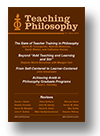|
articles |
|
1.
|
Teaching Philosophy:
Volume >
38 >
Issue: 2
Sarah Cashmore
Changing Values in Teaching and Learning Philosophy:
A Comparison of Historical and Current Educational Approaches
abstract |
view |
rights & permissions
| cited by
This paper examines the pedagogical values inherent in various traditions of philosophy education, from the ancient Greeks to current practices in Ontario high schools, and asks whether our current educational practices are imparting the philosophical values we wish to bestow upon our learners. I compare the approaches of Socrates, Descartes, and Dewey on the nature of philosophy and the pedagogical frameworks they defend for transmitting the “spirit” of philosophy, and then examine the Ontario curriculum guidelines for the teaching of philosophy. In past philosophical traditions, dynamic growth, free questioning, and social responsibility are considered essential to the practice of philosophy. Certain factors in today’s educational institutions limit students’ abilities to achieve those values, although the appeal to these values is the same. I end with recommendations for amendments to the Ontario curriculum expectations that would help put the philosophical development of the individual student more clearly at the centre of these guidelines.
|
|
|
|
|
2.
|
Teaching Philosophy:
Volume >
38 >
Issue: 2
Alexandra Bradner
How to Teach Philosophy of Science
abstract |
view |
rights & permissions
| cited by
Philosophy of science is a challenging course to teach. This paper offers suggestions for early-, middle- and late-career professors who teach philosophy of science at the undergraduate or graduate level. The advantages and disadvantages of four different course designs are discussed, and a list of possible syllabus topics is presented. The paper encourages a thoroughgoing approach to inclusive pedagogy: it recommends that we look for ways to highlight a range of underrepresented voices throughout the semester, instead of tacking on one or two feminist readings at the end of a course. The author reports success with two forms of student assessment, in particular: a peer participation grade and a series of short critical response papers. Also covered are learning goals, textbook selection, and faculty assessment.
|
|
|
|
|
3.
|
Teaching Philosophy:
Volume >
38 >
Issue: 2
Christopher S. Gifford
How to Teach Metaphysics
abstract |
view |
rights & permissions
| cited by
We present some teaching materials for metaphysics which use the method of introducing issues via puzzles, paradoxes, problems, and conundrums in metaphysics. The method is motivated by the aim to increase student participation and engagement in metaphysical issues so that the student considers and understands philosophical theories based on specific metaphysical concepts. These materials are a result of distill- ing first and second year undergraduate academic materials into simple presentations that retain the core focus on salient concepts. The presented teaching methods share the same approach as Raymond Smullyan’s puzzle-first approach to teaching. Potential goals for the material are numerous; one main goal is the development of the individual student’s independent, original, and creative philosophical thinking and analysis as applied to the area of metaphysics. Other goals include the appreciation of overlap between different subareas within metaphysics - overlaps that we note. The article finishes with a further consideration of the importance and utilization of the emotions elicited from materials of philosophical problems and how these can be best incorporated into the teaching methods.
|
|
|
|
|
review article |
|
4.
|
Teaching Philosophy:
Volume >
38 >
Issue: 2
Dennis M. Weiss
Recent Texts in Philosophy of Law
abstract |
view |
rights & permissions
| cited by
Courses in the philosophy of law provide philosophy departments an opportunity to focus on timely and relevant questions affecting the lives of undergraduates as well as attract students interested in the legal profession to the study of philosophy. This review article examines four recent texts in philosophy of law, three anthologies and a single-authored introductory text, and discusses their suitability to the classroom. After an overview identifying key features of each text, several comparative points are made relevant to teaching philosophy of law. The diversity of issues, cases, and approaches to philosophy of law evinced by these textbooks suggests that the faculty member selecting texts should choose carefully.
|
|
|
|
|
book reviews |
|
5.
|
Teaching Philosophy:
Volume >
38 >
Issue: 2
Christopher Buford
The First Sense: A Philosophical Study of Human Touch, by Matthew Fulkerson
view |
rights & permissions
| cited by
|
|
|
|
|
6.
|
Teaching Philosophy:
Volume >
38 >
Issue: 2
Geoff Georgi
Philosophy of Language: An Introduction, by Chris Daly
view |
rights & permissions
| cited by
|
|
|
|
|
7.
|
Teaching Philosophy:
Volume >
38 >
Issue: 2
Robert L. Gray
Philosophy: Traditional and Experimental Readings, ed. Fritz Allhoff, Ron Mallon, and Shaun Nichols
view |
rights & permissions
| cited by
|
|
|
|
|
8.
|
Teaching Philosophy:
Volume >
38 >
Issue: 2
Richard Greene
A Critical Introduction to Skepticism, by Allan Hazlett
view |
rights & permissions
| cited by
|
|
|
|
|
9.
|
Teaching Philosophy:
Volume >
38 >
Issue: 2
Trevor Hedberg
Evidentialism and the Will to Believe, by Scott Aikin
view |
rights & permissions
| cited by
|
|
|
|
|
10.
|
Teaching Philosophy:
Volume >
38 >
Issue: 2
Paul Nedelisky
Properties, by Douglas Edwards
view |
rights & permissions
| cited by
|
|
|
|
|
11.
|
Teaching Philosophy:
Volume >
38 >
Issue: 2
Christopher Star
The Roman Search for Wisdom, by Michael K. Kellogg
view |
rights & permissions
| cited by
|
|
|
|
|
12.
|
Teaching Philosophy:
Volume >
38 >
Issue: 2
Clint Tibbs
Exploring Philosophy: An Introductory Anthology, 5th edition, edited by Steven M. Cahn
view |
rights & permissions
| cited by
|
|
|
|
